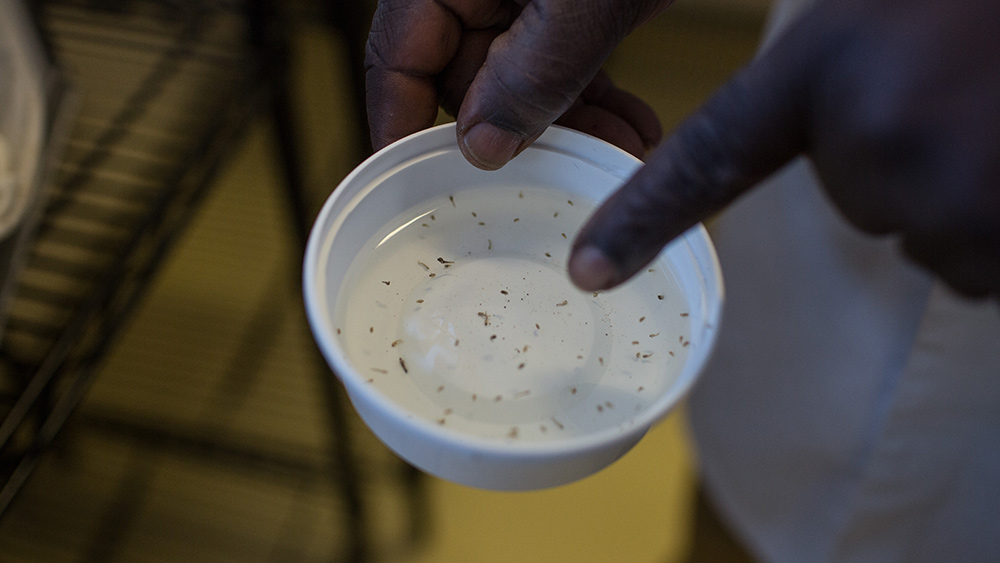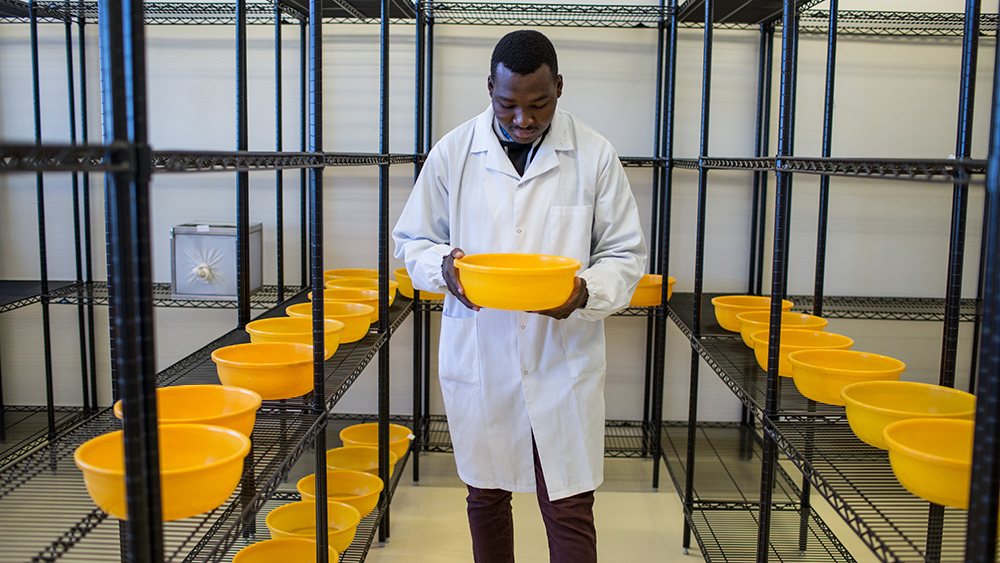Malaria Prevention in Mozambique: Transforming Action into Results
Summary
- Mozambique has made significant progress in preventing malaria since its partnership with the U.S. President’s Malaria Initiative (PMI) in 2007.
- Life-saving interventions such as bed nets and preventive treatment for pregnant women contributed to a 28% reduction in reported malaria hospital admissions in the past five years.

CDC, through PMI funding, supports Mozambique’s National Institute of Health Medical Entomology Laboratory. This lab grows mosquito colonies for malaria prevention and control and research and evaluation efforts.
Credit: Ricardo Franco/CDC
In Mozambique, pregnant women and children under age five have the highest malaria mortality rates. This impact is even more significant in certain provinces, like Cabo Delgado, where in 2018, an average of two of every three children under age five tested positive for malaria.
Several factors drive the high transmission rate of this disease. Climatic and environmental conditions, such as favorable temperatures and stagnant rainwater, create ideal breeding conditions for mosquitoes that transmit malaria. A large portion of the population lives below the poverty line, there is lack of housing and limited access to prevention methods. It is also common for people to seek out traditional healers instead of clinical services when symptoms occur.
PMI is led by the U.S. Agency for International Development (USAID) and implemented with the U.S. Centers for Disease Control and Prevention (CDC). Both agencies offer technical assistance to the Ministry of Health of Mozambique (MOH) to develop and implement strategies and monitor and evaluate program impacts.
PMI focuses on strengthening Mozambique’s health organization’s current capacity, effectively leading and implementing evidence-based malaria prevention and control interventions.

Mozambique INS staff checks a culture of mosquito larvae. Mosquito research and evaluation are important to prevent and control vector-borne diseases.
Credit: Ricardo Franco/CDC
On the Frontline
CDC’s Mozambique office and staff in headquarters play a critical role in the PMI program by co-leading the design and monitoring of its annual $29 million portfolio. CDC assistance includes strengthening the quality and planning of vector control interventions, essential to kill mosquitos and prevent disease.
CDC provides critical information on the type of mosquito vectors, their density, biting patterns, and susceptibility to insecticides. This, in turn, drives interventions such as indoor residual spraying and Insecticide-Treated Net distributions (ITNs).
The PMI program also implements social and behavior change interventions to improve individual and community knowledge, attitudes, and practices related to malaria prevention, diagnosis, and treatment.
Additionally, since 2009, CDC has supported a training program that increases the capacity of the MOH’s staff to collect, analyze, and interpret data of epidemiologic investigations. The Mozambican Field Epidemiology and Laboratory Training Program (FETP) is created by MOH, the Mozambican National Health Institute (INS), and the Eduardo Mondlane University’s Faculty of Medicine, with CDC’s support.
FETP supports the National Malaria Control Program (PNCM, in Portuguese), to conduct investigations and evaluations to provide data integral for decision-making.
Emergency Response
CDC provides critical services in emergencies. This support proved vital for helping strengthen Mozambique’s health systems after the country was hit by two tropical cyclones, Idai and Kenneth, between March and April 2019.
The cyclones reduced access to bed nets and left more mosquitoes. According to the U.N. Office of Coordination and Humanitarian Affairs, more than 26,700 malaria cases were registered in the regions affected by the cyclones. PMI and PNCM rapidly mobilized to quantify malaria-related needs. FETP led the surveillance response, providing data to assess the coverage of malaria control interventions.
Since 2017, Cabo Delgado has experienced a humanitarian crisis because of an armed insurgency that has displaced thousands of people. Working with CDC, PMI recently supported the launch of a three-round Mass Drug Administration (MDA) campaign in Cabo Delgado among Internally Displaced Persons to prevent malaria. It provided malaria treatment to every person living within a defined geographical area. All eligible people received treatment to prevent malaria regardless of whether they had malaria.
The intervention received support from CDC’s Division of Parasitic Diseases and Malaria (DPDM) and Division of Global Health Protection (DGHP). Building on experience gained in Haiti, a CDC DGHP team developed a dashboard to actively monitor campaign progress, informing the timing and spacing of MDA, and then evaluating to assess coverage and impact.

PMI staff coat the walls with insecticide to kill mosquitoes and prevent malaria. CDC works with the Mozambique National Malaria Control Program to build technical leadership and capacity to implement effective prevention and control.
Credit: Duartina Francisco/Vector Link Project